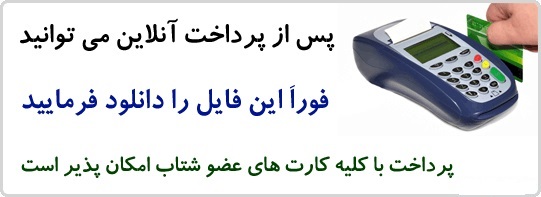لینک دانلود و خرید پایین توضیحات
فرمت فایل word و قابل ویرایش و پرینت
تعداد صفحات: 30
جامعه مدنی و نهادهای غیردولتی در ایران؛چالشها و راه کارها
چکیده
نهادهای مدنی به معنای جدید آن ریشه در تاریخ مغرب زمین و پیوند ناگسستنی با جامعه مدنی دارد. آشنایی ایرانیان با غرب و توجه روشنفکران ایرانی به مدرنیسم در قرن نوزده سبب توجه برخی از ایرانیان به این نهادها شد. استقرار مشروطیت در ایران و تدوین قانون اساسی اگر چه تشکیل و فعالیت این نهادها را قانونی ساخت اما در تاریخ معاصر ایران، به استثنای مقاطع کوتاهی، هیچگاه امکان فعالیت برای این نهادها فراهم نشد. پیروزی انقلاب اسلامی در ایران فرصت مناسب برای تشکیل و فعالیت این نهادها فراهم ساخت. اما وقوع برخی حوادث و رویدادها همراه با حاکم شدن مشارکت توده ای در جامعه یکبار دیگر این فرصت را از میان برد. بقدرت رسیدن آقای خاتمی در ایران و طرح جامعه مدنی از سوی وی ضرورت جایگزینی مشارکت سازمان یافته بجای مشارکت توده ای را عیان ساخت. مهمترین ابزار برای نیل بدین منظور شکل گیری نهادهای مدنی برای ایفای نقش واسط میان دولت و ملت بود. بدین ترتیب یکبار دیگر نهادهای مدنی در ایران امکان حیات یافتند. اما این بار نیز این نهادها، همانند مقاطع قبلی، از جانب سه حوزه حاکمیت، مردم و نظام بین الملل در معرض تهدید قرار دارند، لذا حیاتی ترین موضوع برای سازمانهای مردمی حاضر در ایران شناخت چالشها و انتخاب راهکارهای مناسب برای مقابله با آنهاست.
Faculty of Admin. Sciences & Econ. Journal,
University of Isfahan.
Vol.17, No.2 , 2005
Civil Society and Non-Governmental Institutions in Iran: Challenges and Solutions
H. Masoudnia
Abstract
The historical origin of civil institutions and its new implication stem from the Western World. Civil institutions have close connection with civil society. The influence of Western modernist thoughts into Iranian society and its adoption by Iranian intellectuals in 19th century made civil institutions a political target for Iranian political activists. For the first time, the constitutional revolution in Iran (1906) brought about a historical opportunity for establishing civil institutions, but very soon this hope was vanished. In the contemporary history, rarely a suitable opportunity for establishing of civil institutions was evolved in Iranian political context. The Islamic revolution in Iran brought opportunity for the Iranian elites, but the trend of the post – revolution developments and populist contribution restricted the opportunities. Mr. Khatami's empowerment and the introduction of civil society and replacing it with populism were addressed, so the civil institutions play a mediate role between the society and government. But again, that opportunity was threatened by some parts of the Iranian sovereignty, people and the international system. So, currently the most important issue for civil society activists in Iran is recognition of challenges and solutions for establishing civil institutions.
Keywords: Civil Society, Civil Institutions, Political development, Mr. Khatami, Challenge

مقاله جامعه مدنی و نهادهای غیردولتی در ایران؛چالشها و راه کارها 27 ص


























